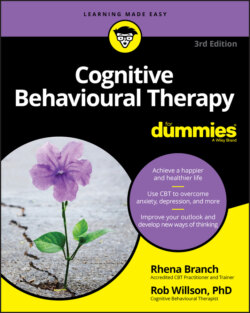Читать книгу Cognitive Behavioural Therapy For Dummies - Rob Willson - Страница 30
Overgeneralising: Avoiding the Part/Whole Error
ОглавлениеOvergeneralising is the error of drawing global conclusions from one or more events. When you find yourself thinking ‘always’, ‘never’, ‘people are …’ or ‘the world’s …’, you may well be overgeneralising. Take a look at Figure 2-6. Here, our stick man sees one sheep in a flock and instantly assumes the whole flock of sheep is black. However, his overgeneralisation is inaccurate because the rest of the flock are white sheep.
© John Wiley & Sons, Inc.
FIGURE 2-6: Overgeneralising.
You might recognise overgeneralising in the following examples:
You feel down. When you get into your car to go to work, it doesn’t start. You think to yourself, ‘Things like this are always happening to me. Nothing ever goes right’, which makes you feel even more gloomy.
You become angry easily. Travelling to see a friend, you’re delayed by a fellow passenger who cannot find the money to pay her train fare. You think, ‘This is typical! Other people are just so stupid’, and you become tense and angry.
You tend to feel guilty easily. You yell at your child for not understanding his homework and then decide that you’re a thoroughly rotten parent.
Situations are rarely so stark or extreme that they merit terms like ‘always’ and ‘never’. Rather than overgeneralising, consider the following:
Get a little perspective. How true is the thought that nothing ever goes right for you? How many other people in the world may be having car trouble at this precise moment?
Suspend judgement. When you judge all people as stupid, including the poor creature waiting in line for the train, you make yourself more outraged and are less able to deal effectively with a relatively minor hiccup.
Be specific. Would you be a totally rotten parent for losing patience with your child? Can you legitimately conclude that one incident of poor parenting cancels out all the good things you do for your little one? Perhaps your impatience is simply an area you need to target for improvement.
Shouting at your child in a moment of stress no more makes you a rotten parent than singing him a favourite lullaby makes you a perfect parent. Condemning yourself on the basis of making a mistake does nothing to solve the problem, so be specific and steer clear of global conclusions. Change what you think you can and need to but also forgive yourself (and others) for singular errors or misdeeds.
